
Related
Guests
- Joseph CirincionePresident of the Ploughshares Fund, a global security foundation focused on nuclear weapons policy and conflict resolution. Previously, he was senior vice president for national security and international policy at the Center for American Progress and director for nonproliferation at the Carnegie Endowment for International Peace. He was also a staff member of the House Committee on Armed Services and the Committee on Government Operations. His latest book is called Bomb Scare: The History and Future of Nuclear Weapons.
Links
This week marks the fortieth anniversary of the Nuclear Non-Proliferation Treaty, when nuclear powers agreed to eventually eliminate their nuclear weapons, and non-nuclear states agreed not to seek to develop nuclear weapons capabilities. Forty years later, there are 189 signatories to the treaty and nine nuclear armed states in the world. The United States and Russia still have the world’s largest stockpile of nuclear weapons. We speak with Joseph Cirincione, president of the Ploughshares Fund and author of Bomb Scare: The History and Future of Nuclear Weapons. [includes rush transcript]
Transcript
AMY GOODMAN: This week marks the fortieth anniversary of the Nuclear Non-Proliferation Treaty. The United States and other nuclear powers agreed to eventually eliminate their nuclear weapons, and non-nuclear states that signed onto the treaty agreed they would not seek to develop nuclear weapons capabilities.
Forty years later, there are 189 signatories to the treaty and nine nuclear-armed states in the world. The United States and Russia still have the world’s largest stockpile of nuclear weapons. The seven other nuclear powers are China, France, Britain and the only four non-signatories to the treaty: Israel, India, Pakistan and North Korea.
I’m joined now by one of the country’s foremost researchers and authors on nuclear weapons and disarmament. He joined the Ploughshares Fund as president this spring. He has advised Democratic presidential candidate Barack Obama and was previously the senior vice president for national security and international policy at the Center for American Progress and director of nonproliferation at the Carnegie Endowment for International Peace. His latest book is called Bomb Scare: The History and Future of Nuclear Weapons. Joseph Cirincione joins us here now in Aspen, Colorado.
Welcome to Democracy Now!
JOSEPH CIRINCIONE: Good morning, Amy. It’s a pleasure to be here.
AMY GOODMAN: How significant is this anniversary?
JOSEPH CIRINCIONE: Well, it’s a milestone in our efforts to stop the spread of nuclear weapons. The treaty has been much more successful than many people expected, although not as successful as we had hoped. In 1960, John Kennedy warned that there could be twenty, twenty-five, even thirty nations with nuclear weapons. This treaty is a major reason why the spread of nuclear weapons has been confined to a relative handful of nations.
And the anniversary comes at a particularly important time when there is renewed interest, in fact, a renewed hope that we can do much more to eliminate the 26,000 nuclear weapons still held by nine nations today. A new drive to eliminate these weapons has begun, attracting some very, very high-level support.
AMY GOODMAN: Where is this happening?
JOSEPH CIRINCIONE: Well, the interesting thing about this is that it’s not coming primarily from the left, so this is not the nuclear freeze movement or massive demonstrations, which have played an important role in the past. It’s coming from the very heart of America’s security elite, former secretaries of state Henry Kissinger and George Shultz, not people you would normally associate with drives to abolish nuclear weapons. and former defense secretary William Perry, and former Senate Armed Services Committee chairman Sam Nunn. These four, sometimes called “the four horsemen,” have issued a call for a world free of nuclear weapons, saying that now is the time for the US to reaffirm the central goal of the Non-Proliferation Treaty, that is, our pledge to eliminate our nuclear weapons as part of the deal, so that other nations will never acquire them.
AMY GOODMAN: Who’s got them? Explain.
JOSEPH CIRINCIONE: The US and Russia have 95 percent of the world’s arsenals. We have about 10,000 weapons, far more than any conceivable military contingency. Russia has an estimated 10,000 to 15,000 nuclear weapons. The rest of the countries number their nuclear weapons in dozens, so United Kingdom, about 200; France, China, about the same; Israel, somewhere between 100 and 200; India and Pakistan, enough material for between fifty and 100 weapons; and North Korea has less than ten. And we’re now engaged in a process to get rid of those.
AMY GOODMAN: In terms of the countries who admit they have them and who don’t?
JOSEPH CIRINCIONE: Well, I think —-
AMY GOODMAN: For example, Israel, you say that it has -—
JOSEPH CIRINCIONE: Israel is the only country that refuses to acknowledge its nuclear status, nor does it deny it. Everyone else has sort of seen these weapons as a source of national pride and prestige.
AMY GOODMAN: Why doesn’t Israel admit it?
JOSEPH CIRINCIONE: It actually works out fairly well for US policy. They don’t want to acknowledge that they have nuclear weapons, because they don’t want other countries in the region to be under pressure to imitate or to match their nuclear stockpile.
AMY GOODMAN: Like India and Pakistan?
JOSEPH CIRINCIONE: Well, no, like Iran, Iraq, Saudi Arabia, Egypt. Egypt used to have a nuclear program, for example, in the ’70s. It quit the program to join the Non-Proliferation Treaty. It’s been a fairly stable nuclear situation in the Middle East until recently. The major nation in the world we’re concerned about at all is Iran with its civilian nuclear program that could be used for military purposes.
AMY GOODMAN: Right. With India and Pakistan, I meant that the kind of arms race or kind of competition that you see there.
JOSEPH CIRINCIONE: Oh, exactly right. You know, Pakistan long had the knowledge to make a nuclear weapon, but it didn’t do that until 1998, when India detonated a nuclear test. After that, Pakistan was under tremendous domestic pressure to match it, which it soon did.
AMY GOODMAN: Your book, Joseph Cirincione, Bomb Scare: The History and Future of Nuclear Weapons — what’s the future?
JOSEPH CIRINCIONE: Well, there’s two alternative future. One is return to that nightmare world that Kennedy warned about, and we’re at this nuclear tipping point. If we don’t stop Iran, if we don’t stop North Korea, if the US continues to insist that it needs nuclear weapons for its security and develops new nuclear weapons, then it’s almost inevitable that these stockpiles will spread. And it won’t just be potential adversary nations; it’ll be our friends. Saudi Arabia is interested. Turkey is interested. Japan could make a nuclear weapon in three to four months. It’s only a political decision not to. So you could see that nightmare world, which would bring us much closer to regional, maybe global, nuclear war.
The alternative is not just to reduce this, is not just to keep our weapons and try to stop others; it’s to embark on a real non-nuclear road. And this is what’s so encouraging to me over the last few years, to see this call for a nuclear-free world emanating from senior former officials, not just in the United States, but in other countries. And that’s the trick, and that’s what I talk about in Bomb Scare, to really take seriously this goal of eliminating nuclear weapons. Only then can we make sure we never use these horrible —-
AMY GOODMAN: Why do states want nuclear weapons?
JOSEPH CIRINCIONE: Historically, the three major reasons are security, number one -— that’s why we got them; we thought Hitler was developing a nuclear weapon, we wanted to offset that potential threat — the second is prestige —-
AMY GOODMAN: But that’s not who the nuclear bomb was used on.
JOSEPH CIRINCIONE: No, it wasn’t. It was used against Japan. And when Russia saw that, they felt threatened, and they developed their nuclear bomb four years after we developed ours. So, again, a security concern motivated Russia, but also prestige. That happened with Russia. You can see it most clearly in the case of India. India calculated that to be a great state required it to assume these totems of power. And it’s those two, security and prestige, that played the greatest role.
But never underestimate the third: the role of domestic politics. You see that happening in Iran now, where President Ahmadinejad is using the nuclear issue to consolidate his otherwise shaky presidency.
AMY GOODMAN: Would you say the same for President Bush?
JOSEPH CIRINCIONE: I would say that many American leaders have seen the nuclear card as one that can be played for domestic gain. For example, why did we invade Iraq? The stated reason was to stop Saddam Hussein from developing a nuclear bomb that it could give al-Qaeda. So they used the nuclear fear to get Americans to support a policy they otherwise never would have.
AMY GOODMAN: North Korea, why the difference with how President Bush has dealt with Iraq, Iran and North Korea?
JOSEPH CIRINCIONE: Well, many countries have questioned why we invaded Iraq, which didn’t have nuclear weapons, and we didn’t invade North Korea, which did, and have drawn the obvious conclusion: we don’t invade North Korea because we can’t, because it’s too risky. And this, of course -—
AMY GOODMAN: Precisely because it does have nuclear weapons.
JOSEPH CIRINCIONE: Because it has nuclear weapons, and so that — it does —-
AMY GOODMAN: So the lesson the countries learn is, if you have a nuclear weapon, the US won’t attack, but if you don’t have a nuclear weapon…?
JOSEPH CIRINCIONE: That’s exactly right, and the Indian chief of staff said this after the first Gulf War, after the ’91 Gulf War. The chief of the army said, “The lesson is, if you think you’re going to go up against the United States, you better get a nuclear weapon.” So we have to change that whole perception. In other words, we have to offer other countries the same deal we offered Libya and that we’re offering North Korea now: if you satisfy our security concerns, we’ll satisfy yours; if you give up these nuclear ambitions, we will guarantee the survival of your regime, we will give you diplomatic recognition, we will change our relationship. That’s the only way you’re going to convince countries to end these programs.
AMY GOODMAN: Joe Cirincione, what about nuclear weapons in space? Can you lay out that picture for us?
JOSEPH CIRINCIONE: There’s been a faction in the American defense establishment that has long thought that space is the place, that it’s the next frontier, that just as we dominate the sea, we should dominate space. And for some, that has meant putting weapons in space, interceptor weapons that can shoot down other countries’ missiles or satellites, or nuclear weapons that can actually rain nuclear holocaust on other countries from space. These kinds of ideas traditionally have kicked around but have been put on the back burner, until this administration. They’ve brought them up front. The official national security policy of the United States is that we should place these weapons in space, in other words, that we should start an arms race in space, something that I think is directly against US national security interests.
AMY GOODMAN: Explain in more detail. How would these weapons be placed in space?
JOSEPH CIRINCIONE: There’s two ways to do it. One, we have reconnaissance and surveillance satellites already, and some people would call those weapons. I don’t think they are. They’re not offensive weapons; they’re strictly defensive weapons. The goal is to place satellites in space that could have weapons use, so killer satellites, for example, that could orbit next to an adversary’s satellite and take it out, interceptor satellites that could be placed in space with tiny rockets in them that could be used to intercept enemy missiles, for example, or actually placing nuclear weapons in space that could hover over another nation’s territory and be used to threaten or potentially attack another country.
AMY GOODMAN: And who’s pushing the space weapons?
JOSEPH CIRINCIONE: It largely has come from the same sort of conservative and neoconservative crowd that advocated the war in Iraq, that advocates taking pre-emptive action against Iran, and it’s supported by some of the more conservative factions in the Air Force who see that the natural extension of the Air Force is to become a space force. It’s a relatively small minority in the US defense establishment, but it’s had an unusual amount of sway.
AMY GOODMAN: Names?
JOSEPH CIRINCIONE: Names associated with this? Well, there’s the general who’s head of the US Space Command, he’s a big advocate of this. You have to look at places like the American Enterprise Institute and the Heritage Foundation, sort of the normal suspects. Baker Spring at the Heritage Foundation is an advocate of this.
AMY GOODMAN: And the weapons manufacturers that are pushing this?
JOSEPH CIRINCIONE: It’s not really a sort of military-industrial complex push. I mean, there’s money to be made here, but there’s money to be made everywhere. So, Boeing, Lockheed, Raytheon all have substantial space contracts, but they also have contracts on land, ground and sea systems, as well.
AMY GOODMAN: Is any other country looking at nukes in space?
JOSEPH CIRINCIONE: No other country. The only -— the way you do get some competition is from China, for example, which has a relatively small space presence but just last year tested an anti-satellite weapon. And so, there’s concern that if the US makes this a push, China will match it and could someday surpassed the United States in this area.
AMY GOODMAN: Is there any push for treaties against nuclear weapons in space?
JOSEPH CIRINCIONE: There is. There’s been efforts to negotiate what they call the peaceful uses of outer space for some time. It’s been tied up in knots at Geneva, where these treaties are usually negotiated. There’s many experts, some of whom the Ploughshares Fund helps finance, advocate a sort of rules of the road for space, because, see, we do a lot of business in space. Almost every time you take — you use the ATM machine, that signal is being transmitted through satellites. Most of our communications, the GPS units that you have, are all based in space. So there’s a big financial interest in keeping that a peaceful place where people can do business, not disrupting those satellites by anti-satellite activity that could damage far more than the intended target. So there’s push to negotiate a peaceful use of outer space treaty. I’m actually fairly optimistic that the next administration could take this up as one of its signature policies.
AMY GOODMAN: Who’s disrupting a treaty around nuclear weapons — against nuclear weapons in space?
JOSEPH CIRINCIONE: Well, you’d have to — neither the Clinton administration nor the Bush administration were very interested in negotiating this. As more and more countries start entering space use, start launching their own satellites, the pressure is growing on US businesses, and therefore the US government, to negotiate a rules of the road agreement.
AMY GOODMAN: Let me ask you about a headline we had a few days ago about a leaked US Air Force review that found major security flaws in most US spaces storing nuclear weapons in Europe. The probe was launched after an incident last August in which a B-52 bomber inadvertently carried nuclear warheads on a cross-country flight. At some bases, nuclear weapons were found to be guarded by private security guards and US soldiers with just months of experience, the report calling for reducing the number of nuclear weapons in Europe to reduce vulnerabilities at overseas locations.
JOSEPH CIRINCIONE: Yeah, two things about that. One, this is an excellent example of the role of non-government organizations. This particular study was unearthed by the Federation of American Scientists. A guy named Hans Kristensen there, just doing his work, doing his job, came up with it, released it, gave the public the information they know.
And the second is what it shows, that as long as you have these weapons just sitting around, bad things are going to happen. The military no longer is very interested in nuclear weapons. In fact, some of the advocates for eliminating nuclear weapons are military commanders who see that these weapons are no longer essential to US national security. But we have thousands of them. So what happens is they’re basically warehoused, and the prestige is lost for these weapons. You don’t get advanced in your career on a nuclear path the way you used to. And the care in tending of these weapons is deteriorating.
So we have a situation where last summer we had six nuclear bombs, the equivalent of sixty Hiroshimas, loaded on a B-52 and flown across the country, and nobody knew they were there. They sat on the tarmac for almost thirty-six hours unguarded by any special troops and just a chain-link fence protecting them. If that’s happening in our country, imagine what’s happening in Russia or in Pakistan. These weapons are a danger wherever they are, whoever has them.
AMY GOODMAN: What has to be done?
JOSEPH CIRINCIONE: You have to reduce and eliminate these weapons. It’s going to take a while, but we’ve done that with chemical weapons, we’re doing it with biological weapons. We’ve taken on far greater national security challenges and met them. I think the task for the next president of the United States is to do exactly what senior leaders are now urging him to do: reaffirm the goal of the elimination of nuclear weapons and marry that up with a series of practical steps, reductions in the US arsenal — we can get down to the low hundreds — bans on any nuclear tests, stop producing any more nuclear material, and, most of all, negotiate with the other nuclear powers or would-be nuclear powers, bring them into the new kind of security regime that we want to see.
AMY GOODMAN: Are you concerned about nuclear power being raised again as a potential alternative to the exploitation of oil?
JOSEPH CIRINCIONE: Yeah. Well, as you know, nuclear power has been around for almost sixty years now. It was — the twin of the nuclear bomb threat was the promise of nuclear energy. But the four major problems that appeared right away are still unresolved: cost — still extremely expensive — safety — an accident in a nuclear plant is far worse than an accident at a coal plant — waste — we still don’t know what to do with the stuff — and finally, proliferation. It’s not the reactor that you’re worried about; it’s the stuff that goes into the reactor and the stuff that goes out. The same facility that can enrich uranium for fuel rods can enrich uranium for nuclear weapons.
This is the whole issue with Iran. They have an enrichment facility they say is for making fuel. Do you trust them? And if nuclear power is going to expand in the world, if we’re going to double or triple the nuclear reactors, then we’re going to double or triple the fuel factories. And these could spread to many other countries, bringing many other countries right up to the brink of nuclear weapons status. That’s an unacceptable threat. I actually think it’s immoral for companies and for countries to be promoting the expansion of nuclear power without taking steps to correct that national ownership of fuel facilities. The only way we’re going to be safe if there is a role for nuclear power, it’s got to be married with an internationalization of those fuel fabrication facilities.
AMY GOODMAN: Well, we will leave it there. Joseph Cirincione, thank you very much for being with us, president of the Ploughshares Fund, a global security foundation focused on nuclear weapons policy and conflict resolution. Thank you very much for joining us.
JOSEPH CIRINCIONE: Thank you, Amy. My pleasure.

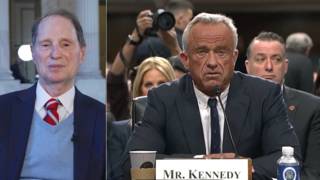
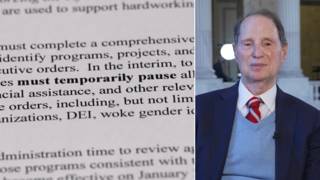
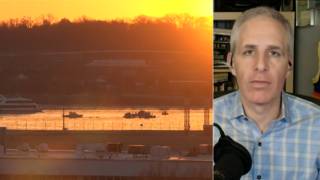
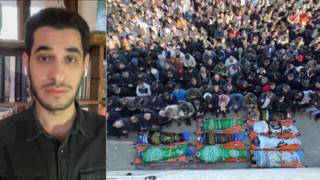





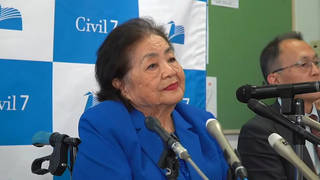

Media Options